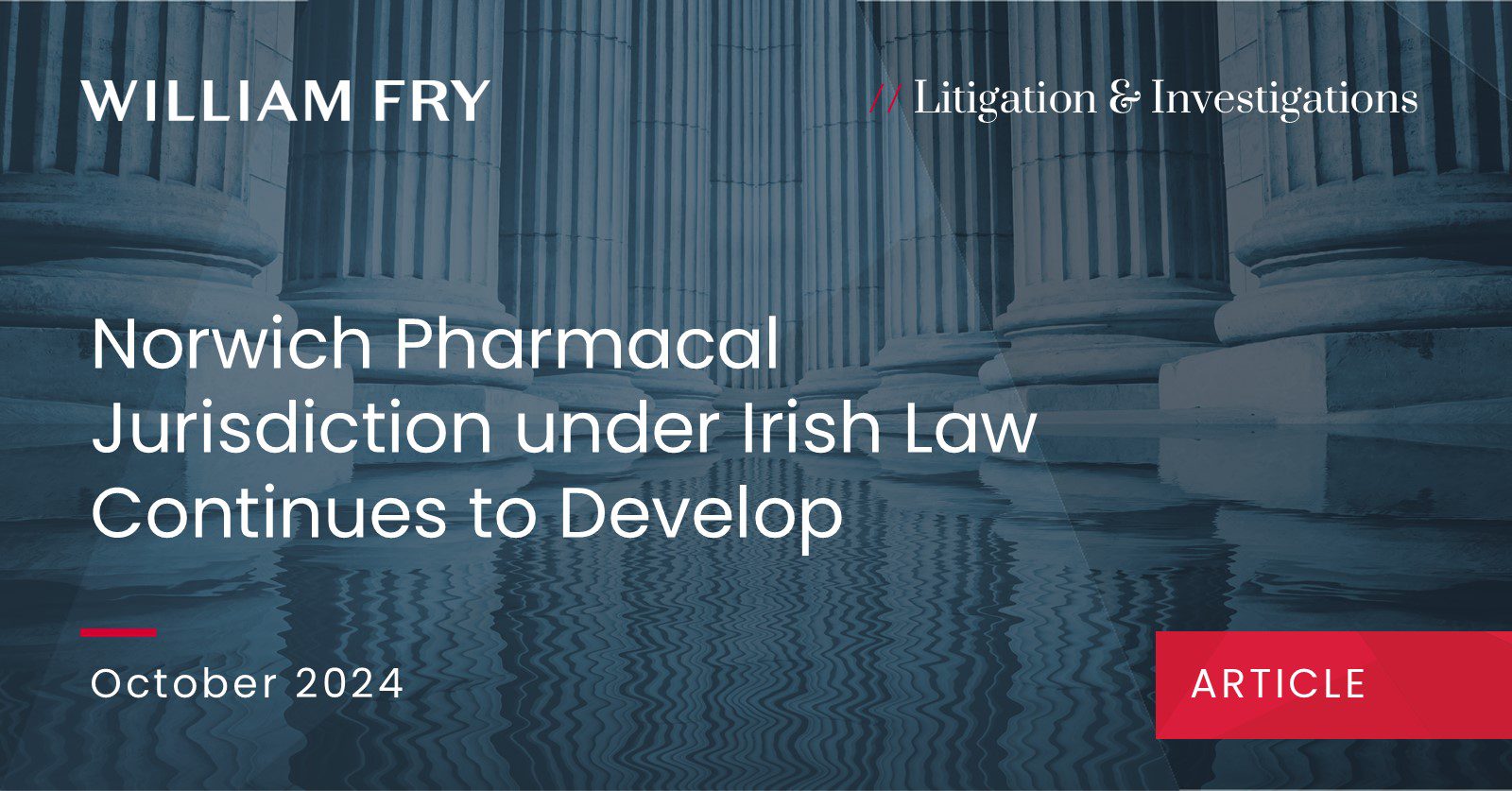Our previous article on the Court of Appeal judgment in Blythe v Commissioner of An Garda Siochana [2023] IECA 255 (Blythe) analysed the Norwich Pharmacal jurisdiction in detail.
The High Court (Court) recently considered the Blythe ruling in an application for a Norwich Pharmacal Order (NPO) against the Garda Commissioner (respondent).
In Randall v Garda Commissioner, the applicant instituted proceedings against the respondent to obtain discovery of a Garda investigation into sexual abuse allegedly perpetrated on him as a child in 1979. On foot of his later complaint to the Gardaí, a suspect was identified, and a Garda investigation was carried out. No prosecution could be brought as the suspect had since died. The applicant sought discovery of the Garda investigation file and disclosure of the identity of the deceased suspect (the NPO).
The parties’ positions:
The applicant maintained that the investigation file was relevant and necessary to enable him to identify and seek redress against the person who sexually assaulted him and there was no alternative access to that information. He argued that he satisfied the ‘threshold conditions’ for a NPO, i.e. he had shown a strong case that a very serious criminal or civil wrong was committed, that the respondent had become ‘mixed up’ in the alleged wrongdoing, and that the information sought was in the respondent’s possession. It was recognised in submissions that the plaintiff could also rely on the disclosed material for the purpose of seeking any redress which he might be entitled to from any parties who might be vicariously responsible for the alleged actions.
The applicant cited Norwich Pharmacal v Commissions of Customs and Excise [1974] AC 133, as authority that the ‘mixed up condition’ does not require direct facilitation or involvement by a defendant in the wrongdoing. He also argued the issue was left open in Blythe, with Collins J’s obiter comments, that the Norwich Pharmacal jurisdiction may extend beyond requiring the disclosure of the identity of the alleged wrongdoer to requiring disclosure of a “missing piece of the jigsaw” to confirm a wrong was committed, enabling a claim to be brought.
The respondent accepted that both the strong case threshold and the possession condition were met and that the disclosure of the identity of the suspect was necessary to institute civil proceedings. It neither objected nor consented to disclosing the name of the suspect. However, it did not accept that the plaintiff demonstrated that the investigation file was necessary to commence proceedings. The respondent submitted that if, during any proceedings brought by the applicant, matters arose which left him at an evidential disadvantage he would be entitled to seek non-party discovery.
Consideration of the Norwich Pharmacal Principles
The Court applied the principles set out in Blythe, and Board of Management of Salesian Secondary College 7 (Limerick) v Facebook Ireland Ltd [2021] IEHC 287, (Salesian Secondary College) to determine whether disclosure should be ordered.
Necessity
The Court found that disclosing the suspect’s identity was necessary for the applicant to pursue potential civil claims. However, the Court was not satisfied that disclosure of the entire investigation file was necessary at this stage as the plaintiff had not demonstrated its essentiality for identifying defendants or initiating proceedings. The Court found the disclosure request had gone far beyond what Collins J in Blythe described as a request for
a specific and limited piece of information (or documentation) which is needed in order to confirm that such a cause of action or complaint is well-founded.
Mixed-up In
The Court considered the evolution of the ‘mixed up in’ condition, which usually requires the respondent to have some involvement in the alleged wrongdoing. The Court noted that there may be, in practice, if not in principle, some overlap between the ‘mixed up in’ condition and the overall justice and proportionality assessment (considered below). While the Court did not definitively resolve the ‘mixed-up in’ condition because the necessity point resolved the question, it noted the tension between the public interest in maintaining the confidentiality of police investigations (underscored by the Garda Siochana Act 2005) and the need for victims to access information for redress.
The Overall Justice
The overall justice condition is only considered by the Court if the applicant has satisfied the threshold conditions. The threshold conditions may then feed into the overall justice condition.
The Court relied on previous authorities that established the need to order disclosure exists only where it is ‘necessary and proportionate’. This requires weighing up certain factors. In considering whether the overall justice in this case required disclosure of the investigation file, the Court balanced factors including the applicant’s right to seek redress, the public interest in maintaining investigative confidentiality, and the absence of a live investigation that could be compromised.
However, since the applicant had not established the necessity of disclosing the entire file, the Court did not consider the proportionality of such an order in this instance. The Court indicated that had necessity been established, it might have exercised its discretion in favour of the plaintiff given the exceptional circumstances of the case and in the absence of any specific evidence as to why a disclosure order of the investigation file might have been disproportionate.
Order and Costs
The Court granted a NPO directing the disclosure of the suspect’s identity but denied disclosing the full investigation file. The plaintiff was given permission to make a further application for disclosure of the file if that later became necessary.
On costs, the Court endorsed the approach in Blythe and Salesian Secondary College, which held that generally, in NPO applications, the respondent ought to recover their costs from the applicant, at least where the respondent itself is not a wrongdoer and where it has bona fide, but unsuccessfully, resisted the NPO order.
The Court therefore awarded costs to the respondent but, having regard to the exceptional circumstances of the case, placed a stay on enforcement to allow the applicant to bring a claim against the alleged wrongdoer(s). The respondent was granted liberty to apply to lift the stay if proceedings were not issued and prosecuted expeditiously.
Important developments to the NPO jurisdiction
The NPO jurisdiction continues to evolve. In this case, the NPO was sought to identify a wrongdoer, which is the typical purpose of the relief. The Court’s obiter comments that it may have granted a NPO of the investigation file if necessity was established, illustrate the courts’ openness to developing the NPO jurisdiction to address a wider range of circumstances beyond the wrongdoer’s identity.
Separately, under amendments to Order 11 of the Rules of the Superior Courts introduced in July 2024, the High Court can grant permission to serve a NPO application outside the jurisdiction. Furthermore, the Minister for Justice intends to introduce a statutory basis for NPOs under Irish law, through amendments to the Defamation (Amendment) Bill during its passage through the Oireachtas this Autumn.
We will keep you updated on other developments as they happen. To discuss NPOs or any aspect of this article in more detail, please contact Paul Convery, Adele Hall, or your usual William Fry contact.
Contributed by Gail Nohilly and Louise Coughlan.



